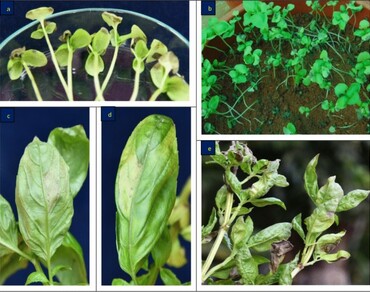Emergence of Basil Downy Mildew in India: need more domestic vigilance to combat spread of Peronospora belbahrii
Pushpavathi B., Madhavi M., Jatoth Rajender, Chandrakala J., Reddy P. Narayan, Rao P. Jagan Mohan
Short Communications | Published: 21 September, 2024
First Page: 408
Last Page: 411
Views: 1827
Keywords: Basil Downy Mildew, n Peronospora belbahriin , ITS rDNA, Seed borne pathogen
Abstract
Downy mildew, caused by Peronospora belbahrii Thines, is the most destructive disease of sweet basil (Ocimum basilicum L.) in all basil producing countries of the world. In India, the disease appeared suddenly in 2019 in greenhouse farms of Simply Fresh Pvt. Ltd., Hyderabad where sweet basil is produced commercially using the seeds imported from Germany. The morphological and molecular characterization of the pathogen confirmed the identity of the pathogen as Peronospora belbahrii. The seed sample when subjected to seed health tests at the notified Seed Testing Laboratory of Seed Research and Technology Centre (SRTC), PJTSAU revealed the seed to seedling transmission of pathogen in sweet basil. The seeds stored for a period of two years under refrigerated conditions (4 °C) also produced infected seedlings under controlled conditions. As the disease is new to India, strict quarantine measures are to be imposed to mitigate the further spread of the disease to new areas in the country.

References
Belbahri L, Calmin G, Pawlowski J, Lefort F (2005) Phylogenetic analysis and real time PCR detection of a presumbably undescribed Peronospora species on sweet basil and sage. Mycol Res 109(11):1276–1287
Ben Naim Y, Falach-Block L, Ben-Daniel BH, Cohen Y (2019) Host range of Peronospora belbahrii, causal agent of Basil Downy Mildew. Israel Eur J Plant Pathol 155(3):789–799
Choi YJ, Choi IY, Lee KJ, Shin HD (2016) First report of downy mildew caused by Peronospora belbahrii on sweet basil (Ocimum basilicum) in Korea. Plant Dis 100(11):2335–2335
Falach-Block L, Ben-Naim Y, Cohen Y (2019) Investigation of seed transmission in Peronospora belbahrii the causal agent of Basil Downy Mildew. Agronomy 9(4):205
Farr DF, Rossman AY (2016) Fungal databases: systematic mycology and microbiology laboratory, online publication ARS, USDA retrieved on 31 May, 2016 from. http://nt.ars-grin.gov/fungaldatabases/
Hansford CG (1933) Annual report of the mycologist. Rev Appl Mycol 12:421–422
Hansford CG (1938) Annual report of the mycologist. Rev Appl Mycol 17:345–346
Kumar S, Stecher G, Li M, Knyaz C, Tamura K (2018) MEGA X: molecular evolutionary genetics analysis across computing platforms. Mol Biol Evol 35:1547–1549
Pushpavathi B, Thakur RP, Rao K, Chandrashekara Rao VP (2006) Characterization of Sclerospora graminicola isolates from pearl millet for virulence and genetic diversity. Plant Pathol J 22(1):28–35
Simon JE, Quinn J, Murray RG (1990) Basil: a source of essential oils. Adv. New Crops 1:484–489
Singh SD, King SB, Werder J (1993) Downy mildew disease of pearl millet. Information Bulletin no. 37. International Crops Research Institute for the Semi-Arid Tropics
Sivaramakrishnan S, Thakur RP, Kannan SEETHA, Rao VP (2003) Pathogenic and genetic diversity among Indian isolates of Sclerospora graminicola from pearl millet. Indian Phytopathol 56(4):392–397
Thines M, Telle S, Ploch S, Runge F (2009) Identity of the downy mildew pathogens of basil, coleus, and sage with implications for quarantine measures. Mycol Res 113(5):532–540
Thines M, Buaya A, Ploch S, Naim YB, Cohen Y (2020) Downy mildew of lavender caused by Peronospora belbahrii in Israel. Mycol Prog 19:1537–1543
Wyenandt CA, Simon JE, Pyne RM, Homa K, McGrath MT, Zhang S, Raid RN, Ma LJ, Wick R, Guo L, Madeiras A (2015) Basil downy mildew (Peronospora belbahrii): Discoveries and challenges relative to its control. Phytopathology 105:885–894
Yadav SS, Suryavanshi P, Nishad I, Sinha S (2022) First report of downy mildew on sweet basil caused by Peronospora belbahrii in India. Plant Dis 106(1):318
Author Information
Seed Research and Technology Centre, Professor Jayashankar Telangana State Agricultural University, Rajendranagar, Hyderabad, India